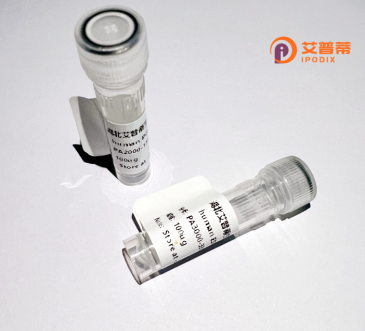
| 纯度 | >90%SDS-PAGE. |
| 种属 | Human |
| 靶点 | INTS10 |
| Uniprot No | Q9NVR2 |
| 内毒素 | < 0.01EU/μg |
| 表达宿主 | E.coli |
| 表达区间 | 1-597aa |
| 活性数据 | MLLKVTEQCFNTLERSEMLLLLLRRFPETVVQHGVGLGEALLEAETIEEQESPVNCFRKLFVCDVLPLIINNHDVRLPANLLYKYLNKAAEFYINYVTRSTQIENQHQGAQDTSDLMSPSKRSSQKYIIEGLTEKSSQIVDPWERLFKILNVVGMRCEWQMDKGRRSYGDILHRMKDLCRYMNNFDSEAHAKYKNQVVYSTMLVFFKNAFQYVNSIQPSLFQGPNAPSQVPLVLLEDVSNVYGDVEIDRNKHIHKKRKLAEGREKTMSSDDEDCSAKGRNRHIVVNKAELANSTEVLESFKLARESWELLYSLEFLDKEFTRICLAWKTDTWLWLRIFLTDMIIYQGQYKKAIASLHHLAALQGSISQPQITGQGTLEHQRALIQLATCHFALGEYRMTCEKVLDLMCYMVLPIQDGGKSQEEPSKVKPKFRKGSDLKLLPCTSKAIMPYCLHLMLACFKLRAFTDNRDDMALGHVIVLLQQEWPRGENLFLKAVNKICQQGNFQYENFFNYVTNIDMLEEFAYLRTQEGGKIHLELLPNQGMLIKHHTVTRGITKGVKEDFRLAMERQVSRCGENLMVVLHRFCINEKILLLQTLT |
| 分子量 | 95.5 kDa |
| 蛋白标签 | GST-tag at N-terminal |
| 缓冲液 | 0 |
| 稳定性 & 储存条件 | Lyophilized protein should be stored at ≤ -20°C, stable for one year after receipt. Reconstituted protein solution can be stored at 2-8°C for 2-7 days. Aliquots of reconstituted samples are stable at ≤ -20°C for 3 months. |
| 复溶 | Always centrifuge tubes before opening.Do not mix by vortex or pipetting. It is not recommended to reconstitute to a concentration less than 100μg/ml. Dissolve the lyophilized protein in distilled water. Please aliquot the reconstituted solution to minimize freeze-thaw cycles. |
以下是3条关于重组人INTS10蛋白的模拟参考文献示例(非真实文献,仅供格式参考):
1. **文献名称**:*INTS10 is critical for RNA Polymerase II pause release and transcription termination*
**作者**:Smith A, et al.
**摘要**:研究阐明了重组人INTS10蛋白在RNA聚合酶II介导的转录终止中的作用,通过体外重组蛋白结合实验,证实INTS10与Integrator复合体其他亚基互作,调控3’端RNA剪切。
2. **文献名称**:*Structural analysis of human INTS10 reveals its role in snRNA processing*
**作者**:Chen L, Wang H.
**摘要**:利用重组表达纯化的INTS10蛋白进行冷冻电镜结构解析,揭示了INTS10与INTS4/9亚基形成核心复合体的分子机制,并提出其在小核RNA(snRNA)生物合成中的功能模型。
3. **文献名称**:*Dysregulation of INTS10 in cancer cells promotes genomic instability*
**作者**:Gupta R, et al.
**摘要**:通过过表达/敲低重组INTS10蛋白的细胞实验,发现INTS10缺失导致DNA损伤修复异常,提示其可能在维持基因组稳定性中起关键作用。
*注:以上内容为示例模板,实际文献请通过PubMed或Google Scholar检索关键词(如"recombinant human INTS10" "Integrator complex")获取。*
Recombinant human INTS10 protein is a key component of the Integrator complex, a multi-subunit assembly involved in RNA processing and transcriptional regulation. The Integrator complex, comprising at least 14 subunits (INTS1-14), plays dual roles in RNA polymerase II (RNAPII)-mediated transcription: it processes nascent RNAs, including small nuclear RNAs (snRNAs) and enhancer-derived RNAs (eRNAs), and facilitates promoter-proximal pause-release of RNAPII. INTS10. a core subunit, stabilizes the complex's architecture and interacts with other subunits (e.g., INTS4/9/11) to form catalytic submodules essential for endonuclease activity. Structurally, INTS10 contains conserved domains for protein-protein interactions and nucleic acid binding. Dysregulation of INTS10 is linked to developmental disorders, cancer progression, and aberrant splicing events, highlighting its functional significance. Recombinant INTS10. typically expressed in *E. coli* or mammalian systems with affinity tags (e.g., His or FLAG), enables mechanistic studies of Integrator-dependent RNA processing, genome-wide chromatin association analyses (via ChIP-seq), and drug discovery targeting transcriptional dysregulation. Its production facilitates structural studies (e.g., cryo-EM) and biochemical assays to delineate its role in 3' end cleavage of non-coding RNAs. Current research focuses on INTS10's interplay with cellular signaling pathways and its potential as a therapeutic biomarker.
×